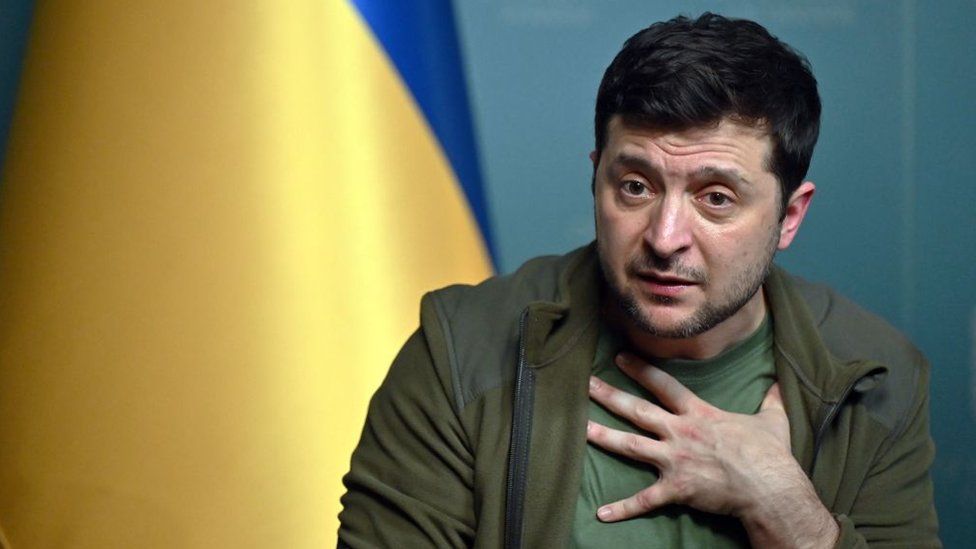I agree with what Greg Sargent says here regarding President Zelensky’s address to Congress today:
Zelensky reiterated his call for the United States and its allies to impose a no-fly zone over Ukraine, and again demanded new shipments of fighter jets, which the administration has been reluctant to deliver.
This is already being portrayed as an effort to shame Biden into plunging deeper into the conflict. But in a way, both men are right.
Zelensky is unquestionably right that the United States and its allies could do more. Yet Biden is also right to be proceeding with extreme caution, and media coverage that obscures the complexities of that calculus is not exactly enhancing the long term prospects for humanity.
Regarding the fighter jets, as I understand it, the hang up seems to be how to get the jets into Ukraine and into the hands of Ukrainians without involving NATO pilots. This doesn’t seem to me to be an unsurmountable obstacle, but maybe there’s something I’m not seeing. U.S. military people have been arguing that Ukraine doesn’t really need the fighter jets, but Ukrainians insist they do, and I wish they could have them.
Greg Sargent quotes Sen. Chris Murphy saying “A no-fly zone is the United States declaring war against Russia.” Right; the no-fly zone can’t be enforced by the U.S. or a European country without risking escalation of war. But if the no-fly zone is being enforced by Ukrainians, why would that be true? Why would providing jets for Ukrainian pilots to fly be a different magnitude of help than providing anti-tank weapons for Ukrainians to fire? Help me out with this one, please.
Sargent continues,
Here’s the larger context. At a time when the United States and its allies are attempting a fiendishly difficult balance — between aiding Ukraine and inflicting sanctions on Russia without provoking World War III — the pressure on Biden to overreach is intense from the media, from Republicans and from certain foreign policy voices.
From the media, President Biden is being peppered with questions about the no-fly zone, even though the answer is always the same, that we don’t want World War III. Sargent continues,
In some cases, questions echo GOP talking points: One reporter asked whether Biden is “showing enough strength against Putin.” Similarly, a New York Times piece intoned that if Biden doesn’t honor Zelensky’s demands, it could open him up to GOP charges that he’s “soft on Russia” and treated that argument respectfully.
This sort of thing lets Republicans get away with calling for more “toughness” without accounting for the obvious world-historical downside risks of too much “toughness.” This effectively launders bad-faith posturing and confuses the debate with simplistic framing rather than illuminating its complexities and trade-offs.
It’s cheap and easy to thump your chest and declare you’d be tougher on Putin when you’re not the one making the decisions, and you’re not the one who’d be blamed if Europe and then the world is dragged into a world war. And, of course, cheap and easy is what Republicans do.
Waldman goes on to quote a historian who notes that younger people don’t remember the Cold War. Putin is “a madman,” the historian says, and no one should assume he wouldn’t resort to nukes if backed into a corner. So let’s not assume that.
There is also talk that Putin has asked China for more weapons. China has denied this, but of course nobody believes China. I’d be a tad surprised if Xi Jinping agrees to giving Russia military aid, because Xi Jinping seems mostly concerned about making China the world’s biggest economic power. And how much does China need Russia? Well, okay, it needs Russian oil. China would be much less vulnerable than Russia to the effects of sanctions, but I doubt Xi Jinping wants to risk losing business from Europe and the U.S. just the same. But anything could happen.
Peace talks between Russians and Ukrainians are centering on a 15-point plan. As I understand it, the plan thus far calls for Ukraine to promise not to join NATO and be officially neutral between Russia and the West. The deal calls for Kyiv renouncing its ambitions to join NATO or host foreign military bases or weapons. In exchange, Moscow would declare a ceasefire and withdraw. Ukraine would also have to accept limitations on its own defense forces but could seek protection from allies such as the US, UK and Turkey.
Ukraine has experience with how much such guarantees are worth. Per the Budapest Memorandum of 1994, Russia was supposed to leave Ukraine alone. I wouldn’t accept this if I were Ukraine, but then I’m not the one being bombarded right now.
Meanwhile, U.S. Secretary of State Antony Blinken says sanctions will not be lifted until there is an irreversable Russian withdrawal from Ukraine. A cease fire alone won’t do it.
He insisted that U.S. sanctions against Russia are “not designed to be permanent,” and that they could “go away” if Russia should change its behavior. But he said any Russian pullback would have to be, “in effect, irreversible,” so that “this can’t happen again, that Russia won’t pick up and do exactly what it’s doing in a year or two years or three years.”
Probably the war in Ukraine won’t end anytime soon.

Volodymyr Zelensky
